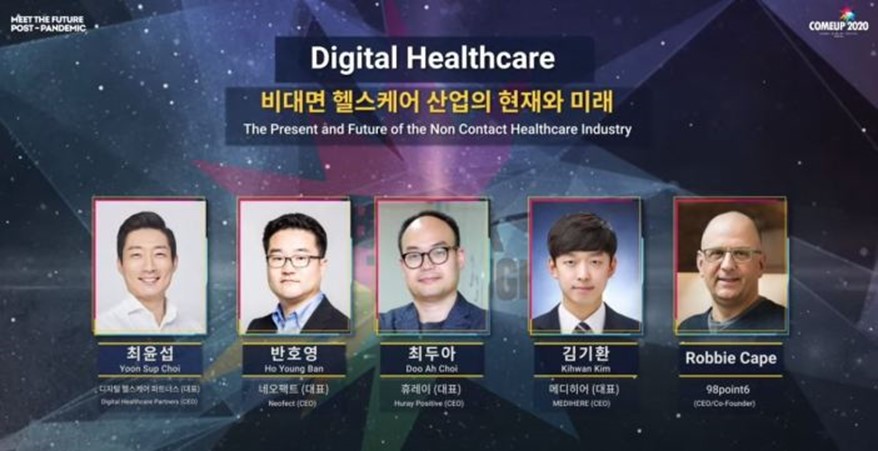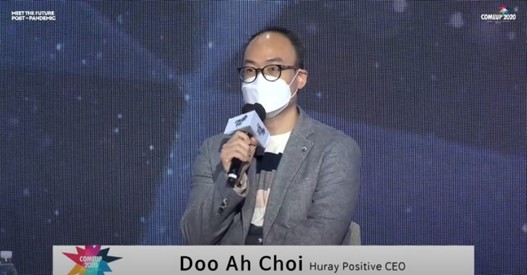The second session on digital healthcare, which is one of the keywords of COMEUP 2020, was held on the topic of “The Past and Future of the Untact Healthcare Industry.”
On November 19th, Choi Yoon Sup, CEO of Digital Healthcare Partners (hereinafter referred to as Choi) was the moderator in the Ilsan CJ Studio. Ban Ho Young, CEO of Neofect (hereinafter referred to as Ban), and Choi Doo Ah, CEO of Huray (hereinafter referred to as Choi) participated in person, and Kim Ki Hwan, CEO of MEDIHERE, and Robbie Cape, CEO of 98points6 in the US (hereinafter referred to as CEO Cape) participated in the session virtually.
The session began with the introduction of the company of the panelists. 98points6 with CEO Robbie Cape is an on-demand primary medical service provider. Consumers can receive a doctor’s examination through their smartphones at any time by paying a specified subscription fee. Neofect developed products and solutions that digitize rehabilitation treatment based on digital technology. It allows remote control for use at home outside of the hospital. Huray offers care in daily life rather than hospital care as well as the management of chronic diseases such as diabetes that affect the course of the disease. MEDIHERE is a telemedicine platform that connects Korean doctors to Korean Americans.
The full-fledged session began with CEO Choi Yoon Sup’s question regarding the impact of the outbreak of COVID-19 on the untact healthcare industry.
First, CEO Robbie Cape explained that the outbreak of COVID-19 has dramatically changed telemedicine and that the company’s service has grown 300% in sales. CEO Kim Ki Hwan from MEDIHERE described that the outbreak of COVID-19 has served as an opportunity to truly understand the need for telemedicine. CEO Choi Doo Ah added, “We received our first investment in 10 years since it was founded. I think the urgency of COVID-19 had a significant influence on the decision-makers in digital healthcare-related investment decisions.” CEO Ban Ho Young answered, “It is an opportunity to create the justification and learning effect for digital change for the medical staff.” In other words, although untact healthcare has existed in the past, the urgency and severity of COVID-19 triggered a change in the positions of the big players and medical staff while creating a new ecosystem at the same time.
In response, CEO Choi Yoon Sup sympathized with the fact that untact healthcare is booming, and he asked for opinions on whether the boom could continue even after the decline of the COVID-19 outbreak. In response, Ban said that even though no one knows the future, it is possible to infer to some extent based on historical examples. According to the historical examples, the shape of a life that has once changed does not easily change dramatically. It indicates that, as we have already become accustomed to untact treatment for over a year, we will not likely go back to the time when we were not used to it.
Choi added a slightly different perspective. According to Choi, untact medical treatment is a digital platform, and the digital platform is created to suit the diverse needs of customers. Choi predicted that a similar pattern would pursue in the post-COVID era. Some areas of the untact field will disappear once again, but the functions that have clearly perceived values to the customers are likely to be maintained. Choi cited teleconferences and drug delivery in the US as examples. On the other hand, Kim described the US example. He said that the types and numbers of vertical services related to telemedicine in the US have been rapidly increasing since the COVID-19 outbreak. He explained, for example, there have been many cases of unicorn companies that have occupied only certain genres, such as the delivery of drugs linked to telemedicine and connection of hair loss treatments.
As the final question, CEO Choi Yoon Sup mentioned that telemedicine is currently only allowed temporarily during the COVID-19 situation and asked each panelist’s position on the sharp conflict of opinions within Korea.
Kim said that he plans to respond to it from two perspectives. It involves providing a platform for medical staff to conduct telemedicine for free and advancing into the field of medical counseling provided to employees for welfare by companies. Kim explained that he himself has committed to an in-depth study of the Korean market to achieve these actions. Ban first mentioned institutional advantages. He said that “remote rehabilitation services passed the regulation in June through what is called a regulatory sandbox,” and described his plans to start remote rehabilitation services in Korea next March.
With the closing of the session, each panelist was asked about their opinion on the current situation. Choi said, “They say that even pigs can fly once typhoon hits. The typhoon of remote medical treatment in Korea will soon begin. We hope this will draw more attention to the public.” Ban said, “Digital healthcare has already advanced in the US, and I hope that there will be more companies that contribute real results in Korea.” Finally, Kim summarized the session with a single phrase. He said, “We hope you try out the service once.” Untact digital companies in Korea have emerged as a way to overcome COVID-19. They have demonstrated confidence. Untact medical service companies are expected to develop in the post-COVID era.



